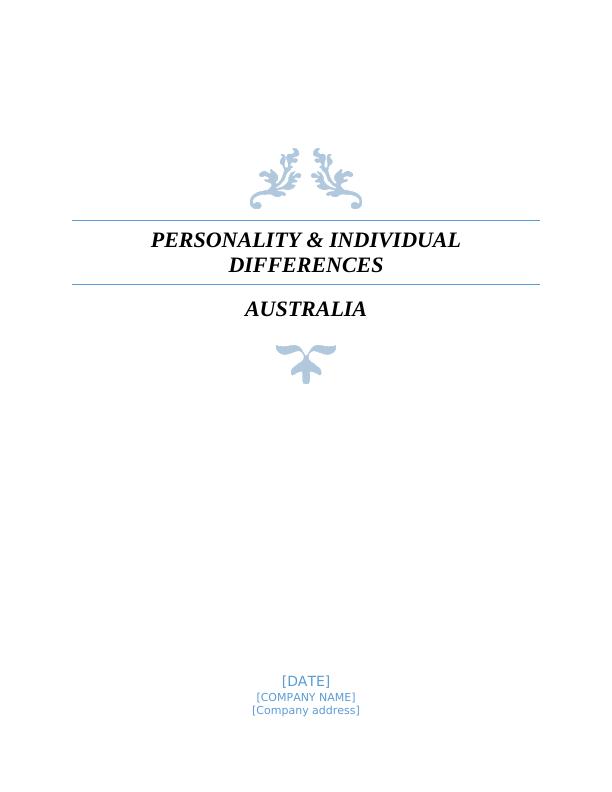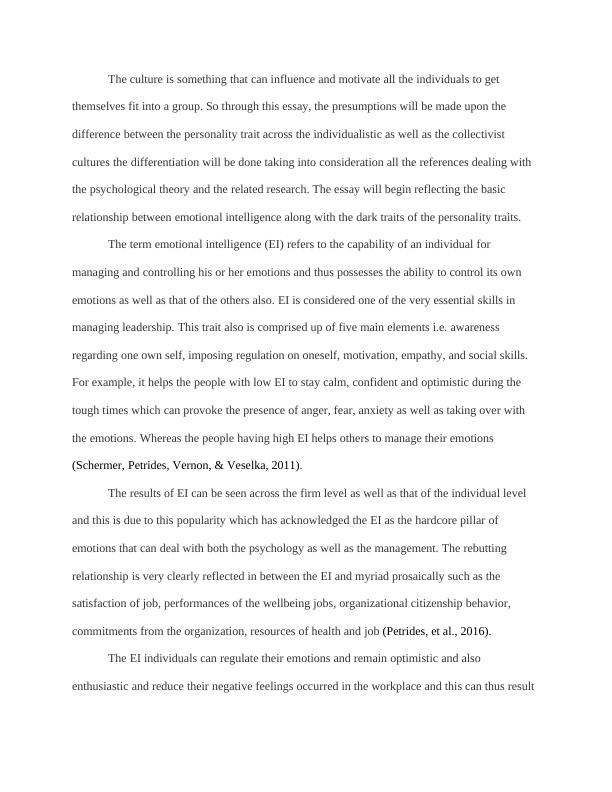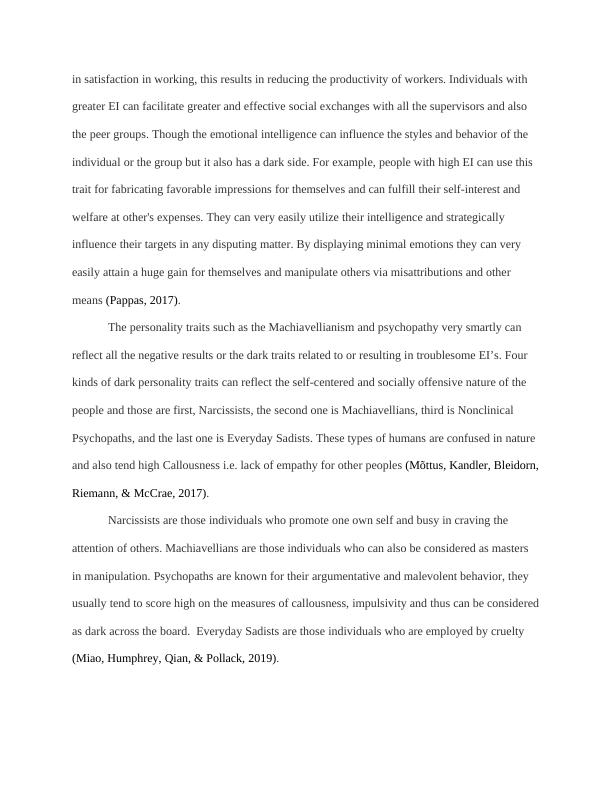Difference between Personality Trait across Individualistic and Collectivist Cultures
Added on 2022-11-10
9 Pages2332 Words291 Views
PERSONALITY & INDIVIDUAL
DIFFERENCES
AUSTRALIA
[DATE]
[COMPANY NAME]
[Company address]
DIFFERENCES
AUSTRALIA
[DATE]
[COMPANY NAME]
[Company address]

The culture is something that can influence and motivate all the individuals to get
themselves fit into a group. So through this essay, the presumptions will be made upon the
difference between the personality trait across the individualistic as well as the collectivist
cultures the differentiation will be done taking into consideration all the references dealing with
the psychological theory and the related research. The essay will begin reflecting the basic
relationship between emotional intelligence along with the dark traits of the personality traits.
The term emotional intelligence (EI) refers to the capability of an individual for
managing and controlling his or her emotions and thus possesses the ability to control its own
emotions as well as that of the others also. EI is considered one of the very essential skills in
managing leadership. This trait also is comprised up of five main elements i.e. awareness
regarding one own self, imposing regulation on oneself, motivation, empathy, and social skills.
For example, it helps the people with low EI to stay calm, confident and optimistic during the
tough times which can provoke the presence of anger, fear, anxiety as well as taking over with
the emotions. Whereas the people having high EI helps others to manage their emotions
(Schermer, Petrides, Vernon, & Veselka, 2011).
The results of EI can be seen across the firm level as well as that of the individual level
and this is due to this popularity which has acknowledged the EI as the hardcore pillar of
emotions that can deal with both the psychology as well as the management. The rebutting
relationship is very clearly reflected in between the EI and myriad prosaically such as the
satisfaction of job, performances of the wellbeing jobs, organizational citizenship behavior,
commitments from the organization, resources of health and job (Petrides, et al., 2016).
The EI individuals can regulate their emotions and remain optimistic and also
enthusiastic and reduce their negative feelings occurred in the workplace and this can thus result
themselves fit into a group. So through this essay, the presumptions will be made upon the
difference between the personality trait across the individualistic as well as the collectivist
cultures the differentiation will be done taking into consideration all the references dealing with
the psychological theory and the related research. The essay will begin reflecting the basic
relationship between emotional intelligence along with the dark traits of the personality traits.
The term emotional intelligence (EI) refers to the capability of an individual for
managing and controlling his or her emotions and thus possesses the ability to control its own
emotions as well as that of the others also. EI is considered one of the very essential skills in
managing leadership. This trait also is comprised up of five main elements i.e. awareness
regarding one own self, imposing regulation on oneself, motivation, empathy, and social skills.
For example, it helps the people with low EI to stay calm, confident and optimistic during the
tough times which can provoke the presence of anger, fear, anxiety as well as taking over with
the emotions. Whereas the people having high EI helps others to manage their emotions
(Schermer, Petrides, Vernon, & Veselka, 2011).
The results of EI can be seen across the firm level as well as that of the individual level
and this is due to this popularity which has acknowledged the EI as the hardcore pillar of
emotions that can deal with both the psychology as well as the management. The rebutting
relationship is very clearly reflected in between the EI and myriad prosaically such as the
satisfaction of job, performances of the wellbeing jobs, organizational citizenship behavior,
commitments from the organization, resources of health and job (Petrides, et al., 2016).
The EI individuals can regulate their emotions and remain optimistic and also
enthusiastic and reduce their negative feelings occurred in the workplace and this can thus result

in satisfaction in working, this results in reducing the productivity of workers. Individuals with
greater EI can facilitate greater and effective social exchanges with all the supervisors and also
the peer groups. Though the emotional intelligence can influence the styles and behavior of the
individual or the group but it also has a dark side. For example, people with high EI can use this
trait for fabricating favorable impressions for themselves and can fulfill their self-interest and
welfare at other's expenses. They can very easily utilize their intelligence and strategically
influence their targets in any disputing matter. By displaying minimal emotions they can very
easily attain a huge gain for themselves and manipulate others via misattributions and other
means (Pappas, 2017).
The personality traits such as the Machiavellianism and psychopathy very smartly can
reflect all the negative results or the dark traits related to or resulting in troublesome EI’s. Four
kinds of dark personality traits can reflect the self-centered and socially offensive nature of the
people and those are first, Narcissists, the second one is Machiavellians, third is Nonclinical
Psychopaths, and the last one is Everyday Sadists. These types of humans are confused in nature
and also tend high Callousness i.e. lack of empathy for other peoples (Mõttus, Kandler, Bleidorn,
Riemann, & McCrae, 2017).
Narcissists are those individuals who promote one own self and busy in craving the
attention of others. Machiavellians are those individuals who can also be considered as masters
in manipulation. Psychopaths are known for their argumentative and malevolent behavior, they
usually tend to score high on the measures of callousness, impulsivity and thus can be considered
as dark across the board. Everyday Sadists are those individuals who are employed by cruelty
(Miao, Humphrey, Qian, & Pollack, 2019).
greater EI can facilitate greater and effective social exchanges with all the supervisors and also
the peer groups. Though the emotional intelligence can influence the styles and behavior of the
individual or the group but it also has a dark side. For example, people with high EI can use this
trait for fabricating favorable impressions for themselves and can fulfill their self-interest and
welfare at other's expenses. They can very easily utilize their intelligence and strategically
influence their targets in any disputing matter. By displaying minimal emotions they can very
easily attain a huge gain for themselves and manipulate others via misattributions and other
means (Pappas, 2017).
The personality traits such as the Machiavellianism and psychopathy very smartly can
reflect all the negative results or the dark traits related to or resulting in troublesome EI’s. Four
kinds of dark personality traits can reflect the self-centered and socially offensive nature of the
people and those are first, Narcissists, the second one is Machiavellians, third is Nonclinical
Psychopaths, and the last one is Everyday Sadists. These types of humans are confused in nature
and also tend high Callousness i.e. lack of empathy for other peoples (Mõttus, Kandler, Bleidorn,
Riemann, & McCrae, 2017).
Narcissists are those individuals who promote one own self and busy in craving the
attention of others. Machiavellians are those individuals who can also be considered as masters
in manipulation. Psychopaths are known for their argumentative and malevolent behavior, they
usually tend to score high on the measures of callousness, impulsivity and thus can be considered
as dark across the board. Everyday Sadists are those individuals who are employed by cruelty
(Miao, Humphrey, Qian, & Pollack, 2019).

End of preview
Want to access all the pages? Upload your documents or become a member.
Related Documents
Developing Emotional Intelligence Skills for the Workplacelg...
|25
|7322
|147
Importance of Emotional Intelligencelg...
|15
|5161
|436
Emotional Intelligence in Organisational Behaviorlg...
|4
|721
|326
Introduction to Leadership in Businesslg...
|14
|4388
|59
Emotional Intelligencelg...
|5
|945
|100
(PDF) Emotional intelligence and nursinglg...
|17
|850
|69
